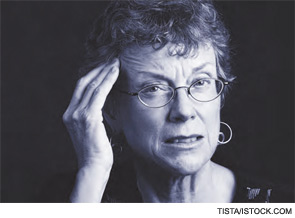BOSTON—Dizziness is a particular danger among the elderly, but extra care taken by physicians can help ease their problems and help keep older patients functioning, panelists said at the 2010 Annual Meeting of the American Academy of Otolaryngology-Head and Neck Surgery, held here Sept. 26-29.
Explore This Issue
October 2010Treatment tactics used for younger patients might not always be suitable for elderly patients, they said, but new therapy tools can help the elderly feel less helpless against the sensation of being off balance.
Concerns about dizziness in elderly patients come as the Baby Boomer generation ages, bringing a huge number of new, older patients, said David Eibling, MD, chair of the AAO-HNS’ Geriatric Otolaryngology Committee. “A tsunami of Baby Boomers is just now hitting the Medicare and Medicaid ages,” he said.

And they will demand a lot from their health care providers, he said. “The elderly folks are not only living longer but they are maintaining a higher level of function,” Dr. Eibling said. “So that, for them, quality of life achieves an even greater significance than it has in prior years.”
Treatment Options
The term “dizziness” suffers somewhat from an identity crisis that might make it difficult for physicians to address in elderly patients, said Michael E. Hoffer, MD, director of the Spatial Orientation Center at the Naval Medical Center San Diego. While dizziness is thought of as a vestibular disorder, it is often influenced by factors that are not vestibular, such as eye disorders, peripheral vascular disease and arthritis of the cervical spine, Dr. Hoffer said.
“It’s unclear whether what we call presbystasis is truly a vestibular disorder or simply the impact of the other diseases associated with aging,” he said. Dysequilibrium Associated with Aging (DAA) might be a more appropriate term, he said.
A common approach to dizziness, just trying to prevent falling, doesn’t serve patients well enough, Dr. Hoffer said. “The fear of going outside because of the risk of falling or the embarrassment is tremendously isolating,” Dr. Hoffer said. “A lot of our hospitals, because of recent rules and laws, have falls prevention programs. That’s not enough…. We need function programs in target areas so that people no longer feel isolated.”
A common malady causing dizziness among the elderly is benign paroxysmal positional vertigo (BPPV), sudden, brief periods of mild to intense dizziness brought on by a change in someone’s head position or by lying down, turning over, or sitting up in bed. It’s usually not life threatening, except when it increases the chance of falling.
Leave a Reply